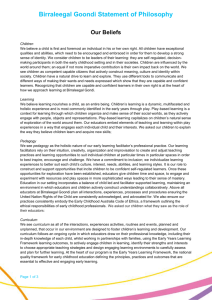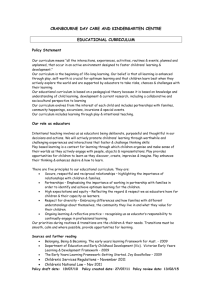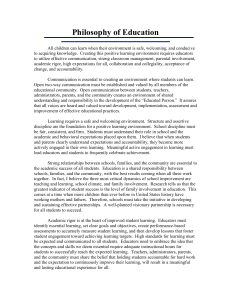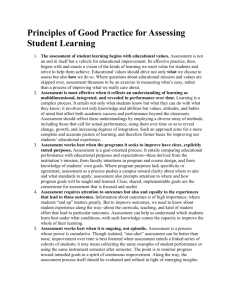Word (docx
advertisement
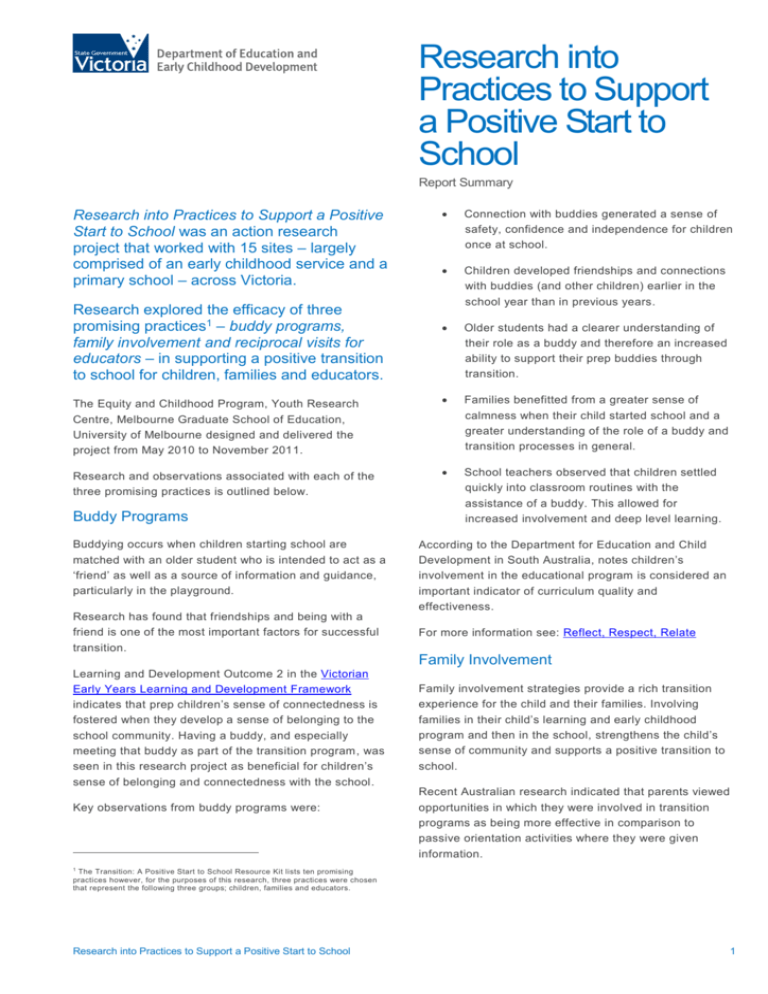
Research into Practices to Support a Positive Start to School Report Summary Research into Practices to Support a Positive Start to School was an action research project that worked with 15 sites – largely comprised of an early childhood service and a primary school – across Victoria. Research explored the efficacy of three promising practices1 – buddy programs, family involvement and reciprocal visits for educators – in supporting a positive transition to school for children, families and educators. The Equity and Childhood Program, Youth Research Centre, Melbourne Graduate School of Education, University of Melbourne designed and delivered the project from May 2010 to November 2011. Research and observations associated with each of the three promising practices is outlined below. Buddy Programs Buddying occurs when children starting school are matched with an older student who is intended to act as a ‘friend’ as well as a source of information and guidance, particularly in the playground. Research has found that friendships and being with a friend is one of the most important factors for successful transition. Connection with buddies generated a sense of safety, confidence and independence for children once at school. Children developed friendships and connections with buddies (and other children) earlier in the school year than in previous years. Older students had a clearer understanding of their role as a buddy and therefore an increased ability to support their prep buddies through transition. Families benefitted from a greater sense of calmness when their child started school and a greater understanding of the role of a buddy and transition processes in general. School teachers observed that children settled quickly into classroom routines with the assistance of a buddy. This allowed for increased involvement and deep level learning. According to the Department for Education and Child Development in South Australia, notes children’s involvement in the educational program is considered an important indicator of curriculum quality and effectiveness. For more information see: Reflect, Respect, Relate Family Involvement Learning and Development Outcome 2 in the Victorian Early Years Learning and Development Framework indicates that prep children’s sense of connectedness is fostered when they develop a sense of belonging to the school community. Having a buddy, and especially meeting that buddy as part of the transition program, was seen in this research project as beneficial for children’s sense of belonging and connectedness with the school. Key observations from buddy programs were: Family involvement strategies provide a rich transition experience for the child and their families. Involving families in their child’s learning and early childhood program and then in the school, strengthens the child’s sense of community and supports a positive transition to school. Recent Australian research indicated that parents viewed opportunities in which they were involved in transition programs as being more effective in comparison to passive orientation activities where they were given information. 1 The Transition: A Positive Start to School Resource Kit lists ten promising practices however, for the purposes of this research, three practices were chosen that represent the following three groups; children, families and educators. Research into Practices to Support a Positive Start to School 1 Key observations from implementing family involvement strategies were: Children displayed a greater sense of calmness, showed more positive attitudes to starting school and quickly established a sense of belonging to the school. Educators developed stronger relationships with children and families and with other educators across early childhood settings. There were improved transition practices based on better understandings of family experiences and needs. Families had an increased understanding of the transition process, a greater willingness to communicate with the school and reduced anxiety associated with their children starting school. Reciprocal Visits for Educators Reciprocal visits involve educators from early childhood settings and primary schools visiting each other’s environments both pre- and post-transition to build relationships and support transition processes for the child, family and educators. There were increased opportunities for communication due to early childhood educators being able to provide earlier and more comprehensive information to parents about the prep year and facilitate communication between parents and prep teachers. Families were confident that the prep teacher was aware of their child’s early childhood experiences and reported a greater satisfaction with the school due to their expectations on school entry being better understood. Conclusion This action research project provides insight into the possibilities presented when educational settings are given the time and space to engage intensively with promising practices. While these observations arise out of a small-scale localised project, they can inform theory and practice for positive transition to school across the state and within a broader national and international context. The overarching observations from the project were that: While each research site chose to focus on one practice, the knowledge gained went beyond their chosen promising practice. This highlighted that practices supporting a positive transition to school are highly interconnected and affect children, families and educators. The use of promising practices enhanced and deepened the relationships between early childhood and school teachers, and between families, children and educators. Strong relationships promote a positive transition to school. Research shows that reciprocal visits for educators supports transition by enabling dialogue and transfer of information between educators. Key observations following the implementation of reciprocal visits for educators were: Children experienced a sense of comfort because of familiarity with educators before their entry to school. Positive first experiences were increased in the school classroom with each child’s abilities and interests being accommodated by tailored programs. Educators developed a deeper understanding and respect for each other’s work. Some sites reported that the educators incorporated each other’s practices into their educational programs, such as more play-based learning into prep classrooms and different skill development activities into early childhood programs in an effort to facilitate a smooth transition to school for children. Families’ confidence in the school increased because of familiarity with educators. Research into Practices to Support a Positive Start to School To see the full report and associated references go to: Research into Practices to Support a Positive Start to School 2
